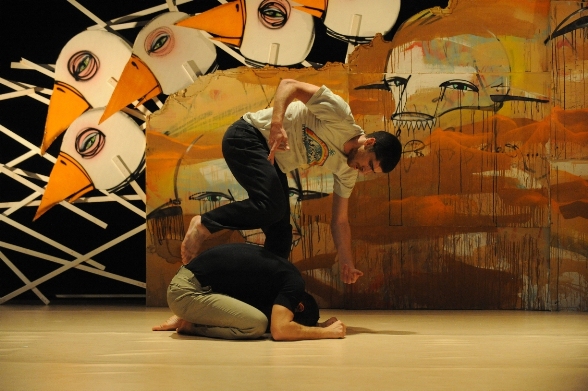
Quiet opens with the sound of water. Three men lie down in the darkness, the shadow of a fourth man stands in front of a wall. As the space fills with light, colorful birds and graffiti can be seen in the background. They could be anywhere, but for anyone who recognizes the hooded eyes and bold lines of the creatures drawn on the wall by Klone, they are here in Tel Aviv. They could be any four men, but they are two Arabs and two Jews, who have been working together to create Quiet, choreographed and directed by Arkadi Zaides.
Quiet is something I have learned to live without since moving to Tel Aviv. Or should I say, Tel Aviv-Yafo? Jaffa? Yaffa? The hyphen, the line that connects or divides those two entities, the multiplicity of languages and identities contained within the name, symbolizes the ambivalence of the relationship. The noise never stops in this city that never sleeps, reinventing itself at every turn. The rumble of buses, the duet of radio music and hammering from the construction site beyond my window, the ring of my neighbor’s phone and the conversation that follows – all these have become the background to every word I write. Surrounded by the sounds of people I do not see, I have learned not to listen, not to be distracted by whatever is going on around me.
What is the meaning of quiet in this environment where the noise is constant, and languages separate people from one another? What kind of communication and connection is possible in this context?
Dance is not a natural meeting place for these kinds of conversations, yet movement offers an alternative to words that is at once more immediate and clear, yet open to interpretation. As choreographer and dancer, Arkadi is both inside the work itself and outside, observing. He was joined in this external view by Joanna Leznierowska who hosted the four men for a month in her apartment in Poznan, during the creative process.
Quiet is a work that speaks in many languages – contemporary dance, capoeira, judo, and Arabic. In reflecting on the work, my mind returns to the opening images: three men lie on their backs, each in a different corner of the stage. Are they relaxing on the Mediterranean sand, or collapsed from exhaustion? One man stands, a shadowed figure. As light slowly fills the space, he begins to move. Bent down, arms outstretched, palms cupped as in an offering or prayer. Moving in the air on the sound of water, he approaches the men, one at a time. Urging them to rise, open palms beckoning, gathering in. No one moves.
He stands once more at the wall. Kneels on the floor, running his fingers through invisible sand, then stands and looks up at the sky, still searching. Hands outstretched, legs churning, running in place. Running without progress.
The patterns repeat: there are images and motions that recur throughout the work. The men move in and out of the narratives, each moving within his personal story, moving in and out of one another’s stories. Each story speaks its own language of movement, rhythm and emotional impact.
There are no conclusions to this narrative. The contact between the men is intense at times, tender at others, about to erupt into violence at other moments. Their movement often takes place at the edge of touch, the space between them replete with emotional tension as if what must be said is almost too much to bear. At times one is intensely aware of the representation of Arab and Jew onstage. At other times they are just four guys hanging out -friends.
There are no conclusions to this narrative. The effort at communication always seems to end up at the wall: a physical expression of frustration and hopelessness. Yet it begins again. Perhaps that is a message of hope.
Quiet
Choreography and direction: Arkadi Zaides
Artistic collaborator: Joanna Lesnierowska
Cast: Muhammed Mugrabi, Rabie Khoury, Ofir Yudilevitch, Arkadi Zaides
Music: Tom Tlalim
Additional tracks by: Ziv Jacob, Domenico Ferrari, Ran Slavin
Set: Klone
Lighting: Firas Roby
Costumes: Salim Schada
Production: Yoav Levi
Co-produced by: Arts Station Foundation, Poznan, Poland
AYELET DEKEL

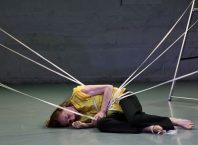
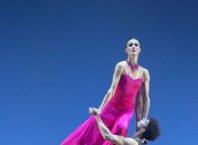
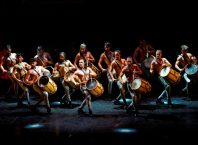
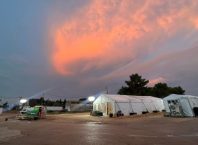
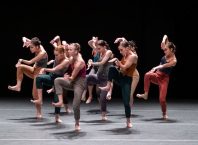
[…] There are no conclusions to this narrative. The effort at communication always seems to end up at the wall: a physical expression of frustration and hopelessness. Yet it begins again. Perhaps that is a message of hope. Read the full Midnight East review here. […]
[…] them replete with emotional tension as if what must be said is almost too much to bear…” (read the full review) Choreography and direction: Arkadi Zaides; artistic collaborator: Joanna Lesnierowska; cast: […]
[…] The impulse to look outward, explore, examine and act in the contemporary local arena led to Quiet, a work with four male dancers, each representing a different individual, ethnic and artistic […]
[…] the conference will be a performance of Quiet – a dance work choreographed by Arkadi Zaides, created through the artistic dialogue of four men […]
[…] Kyr/Zina, the Inbal Pinto/Avshalom Pollak Dance Company with Rushes Plus, Arkadi Zaides’ Quiet, Dana Ruttenberg and Shlomit Fudaminsky, Iris Erez, Yoram Karmi’s Particle Accelerator, Yossi […]
[…] performances A selection from Quiet by Arkadi Zaides a co-production of Arts Station Foundation Poznan, Poland. Music: Tom Talalim […]
[…] Yetzira” first creations of young artists and dancers in various stage arts 15:00 “Quiet” dance by Arkadi Zaides and talk with the audience 16:45 Connecting with the Heart with Merav […]
Comments are closed.